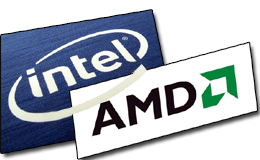Intel to AMD: Your x86 License Expires in 60 Days
Intel this week announced that it would terminate AMD's license to produce x86 processors due to AMD's spinoff company, Globalfoundries.
AMD spun off its manufacturing division and would thereby use the new company to manufacture its own products as well as possibly products from other companies. Due to dwindling financial performance, this was something that AMD deemed necessary. However, Intel said that because the spinoff isn't a subsidiary of AMD, it does not confirm to the license agreement Intel signed with AMD in 2001--the license doesn't automatically transfer to a spinoff company.
From Intel's press release:
Intel Corporation today disclosed that the company has notified Advanced Micro Devices (AMD) that it believes AMD has breached a 2001 patent cross-license agreement with Intel. Intel believes that Global Foundries is not a subsidiary under terms of the agreement and is therefore not licensed under the 2001 patent cross-license agreement. Intel also said the structure of the deal between AMD and ATIC breaches a confidential portion of that agreement. Intel has asked AMD to make the relevant portion of the agreement public, but so far AMD has declined to do so. AMD's breach could result in the loss of licenses and rights granted to AMD by Intel under the agreement.
AMD filed with the U.S. Securities and Exchange Commission, saying that it did not breach any contractual or intellectual agreement with Intel, and based on the original contract, Intel does not have the right to terminate the contract. Intel, argues otherwise. Representatives from Intel said that Globalfoundries is a joint venture with several other companies, including Advacned Technology Investment Co (ATIC), and ATIC does not have a license agreement with Intel.
"AMD cannot unilaterally extend Intel's licensing rights to a third party without Intel's consent," said Bruce Sewell, Intel's general counsel.
Essentially, Globalfoundries allows ATIC to manufacture x86 processors and chipsets. If Intel does go through with the x86 license termination, this would spell big trouble for AMD. Many large OEMs rely and buy from AMD, and if the contract terminated, it would allow Intel to legally go after companies still buying x86-based AMD processors.
Get Tom's Hardware's best news and in-depth reviews, straight to your inbox.
AMD has 60 days to comply with Intel before Intel terminates the x86 contract.
-
grieve I apologize for my ignorance... what patent are we talking about here which Intel has that AMD requires licensing?Reply -
The_Blood_Raven Now I usually scoff at people calling Intel evil, but this is about as evil as it gets. I hope the government steps in and bitch slaps Intel, they are trying for a total monopoly of modern CPUs, that is ILLEGAL!Reply -
jhansonxi This will be an interesting battle to watch. Without the x86 patents AMD is stuck being a video and chipset company in the PC world. It also means that Intel is back to monopoly status. Even if you prefer Intel CPUs the presence of AMD in the market helps keep their prices low.Reply -
frozenlead Since Intel would be the only major x86 processor producing company, couldn't that be considered a monopoly and be subject to anti-trust filings, which would probably reinstate AMD's x86 license?Reply -
jacobdrj The real question is: How is it that people/corporations are allowed to keep their patents after 13ish years, if the whole point is to 'make your profit, and then benefit humanity'. Same goes for copyrights. Make your money, and then it is public knowledge.Reply
I guess the Constitution is just sort of a set of 'guidelines'. -
"I apologize for my ignorance... what patent are we talking about here which Intel has that AMD requires licensing?"Reply
Intel designed and owns the rights to the x86 instruction set. AMD has always been a licensee (due to insistence by IBM on having multiple suppliers). VIA and a couple of other companies also hold licenses from Intel. I believe some of the design of the current x64 standard were AMDs, thus the cross licensing. Maybe I'm wrong about what AMD licenses Intel has in return.
-
HermDawg How will it work with x86-64 licensing? Intel licenses that technology from AMD. If Intel revokes x86 from AMD then AMD would probably revoke x86-64 from Intel. Then all we'd be left with would be 32 bit Intel processors. I really don't think it's Intel's intentions to revoke the x86 license. They probably have some other motive behind this.Reply
